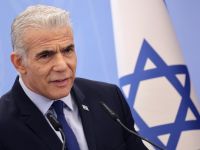By Ahmad Rafat
JERUSALEM (WNL) -- The election of Moshe Katsav as president of Israel was one that few had expected. First and foremost, because his rival in the presidential race was Shimon Peres, the long-serving Labor statesman and one of the best known figures in Israel. But Katsav the outsider was also running at a disadvantage because of his own origins. Born in Iran 59 years ago, he belongs to the Sephardic Jews, which hail from the East and which have traditionally wielded little clout on the Israeli political scene. In the past, all the top government jobs have gone to the Ashkenazi Jews, whose roots were in Europe.
With his surprise election, Katsav has made history, not just by being the first Sephardic Jew to head his country, but also by becoming the first president ever to be appointed from among the second wave of immigrants to Israel. For unlike all his predecessors, who came to Israel before the country was founded, Katsav and his family did not arrive until several years later, in 1951.
The young Katsav and his family moved to Israel from their native Iran not for ideological or religious reasons, but in order to improve their living conditions. The new Israeli president came from a modest background, and even in Israel, he was the only one among his siblings to have studied at university, mainly thanks to the insistence and the sacrifices of his mother. Here, he read history, while at the same time pursuing an early interest in politics.
In spite of the handicap of belonging to the Sephardic branch of the Jews, Katsav managed to be elected mayor of Kiryat Malachi, a suburb of Tel Aviv, at the age of just 20, a neighborhood where he has continued to live until his recent transfer to the presidential palace. Then, as later in his career, the young Katsav stood for Likud, the coalition of right-wing parties in Israel. Subsequent jobs, once elected to the Knesset or Israeli parliament, included minister of transport, minister of tourism and, most recently, deputy prime minister to Likud Premier Benjamin Netanyahu, in the previous Israeli government.
Neither Katsav nor his family has ever forgotten their Iranian origins.
"After more than 50 years here in Israel, my mother still speaks Persian, cooks Persian food, listens to Persian music, reads Persian newspapers and now watches Iranian television via satellite as well," said the Iranian-born president, speaking in the first interview he has given to the non-Israeli press.
As he sipped tea prepared in the Iranian manner, President Katsav, who still speaks Persian as well as Hebrew, talked about his new job and his hopes and fears for the Middle East.
Q: You are the first Sephardic Jew ever to have been elected as president of Israel. Is this a case of the Eastern Jews getting their revenge at last, or is it just a sign of a better balance of power between the two communities?
A: There is no connection between my election and the fact that I belong to the Sephardic community. I don't deny that there are tensions between the Sephardic and Ashkenazi communities in my country, but my election represents an attempt to unite the divisions within Israeli society. A great many of the MPs who elected me were Ashkenazi. I wasn't elected by a particular faction, because had that been the case, I would not have won sufficient votes. That is true of both the political divide, between right and left, and of the religious divide, between the Orthodox Jews and the laity.
I believe my election has a different meaning. I am the only immigrant to have come here after the founding of the state of Israel ever to have been made the country's first citizen. This means that Israel has taken the new reality on board and has decided that I could better represent the current social fabric of the country. The country and its institutions are committed to uniting Israeli society.
Q: In the previous right-wing government, headed by Benjamin Netanyahu, you were deputy prime minister. How do you plan to handle being a Likud president to the present government, which is headed by Labor's Ehud Barak?
A: My election was partly made possible by votes from MPs in the current coalition, who support the government of Ehud Barak. Of the 17 parties present in the Knesset, MPs from 16 parties voted for me. My election should not be seen as a victory for the opposition to the government, or as the revenge of the right over the left. Nor does it mean that the religious factions have won over the lay ones, or that the Sephardic Jews have triumphed over the Ashkenazis.
The reality is very different. On the day that I moved out of my own home and into the presidential palace, I locked my own political ideas in a drawer and hid them in a safe. I represent all Israelis, from right and left, religious and non-religious, Sephardic and Ashkenazis, and also Arab Israelis as well. Often, people forget that a million people, around 20 percent of the entire population, are Arabs with Israeli citizenship.
Q: Let's talk about another cause for divisiveness in Israeli society: religion. The Barak government has set the wheels in motion for a revision of the present constitution which would introduce a clear division between state and religion. What do you think of that?
A: Living in Israel are people who come from more than 70 countries and from five continents. Ours is a country which encompasses a host of cultural, social and linguistic differences. It's a very complex society, but also a very rich one from a cultural point of view. But this wealth often gives rise to deep divisions.
The Jew who came to Israel after the First World War is very different from the Jew who came here just a few years ago, after the fall of the Soviet empire. In the same way, the ideals that brought them here are also different, as are their visions of society, politics, the economy and religion. The expectations of Jews coming from Islamic countries are different from those of Jews who have lived in the West. Some have come from countries ruled by dictators, while others have come from democracies. They bring with them different experiences and different cultural baggage.
Our aim -- and it is an intriguing challenge -- is to build a society in which all these people can find a place. Everything would have been much easier if we hadn't been fighting for our very survival. It shouldn't be forgotten that some of our neighbors have never declared an end to the war between us. As you can see, everything divides us here, including the timing and the path towards peace with the Arabs. I hope to be the president of all the different people who make up the country of Israel.
Q: Jerusalem seems to be a continuing bone of contention between you and the Palestinians. Is any compromise possible on the future of this city?
A: No compromise can be better than the present situation. The current status quo guarantees all three monotheistic religions (Islam, Christianity and Judaism) the right to worship at, and to visit their respective holy sites. For 2000 years, up until the Six-Day War in 1967, that freedom had been denied to one or other of these faiths. Such freedom of worship has no precedence in the history of Jerusalem, so I don't see why we should change something that actually works.
And frankly, I am not at all convinced that the Christians really want to put the fate of their sacred places in the hands of (Palestine Liberation Organization leader) Yasser Arafat. As far as I am concerned, I will do everything to ensure that Muslims and Christians can always enjoy freedom of worship and freedom of movement in Jerusalem. I will oppose anyone who tries to deny this freedom to Muslims, to Christians, and of course to Jews.
Q: If we leave aside the thorny question of Jerusalem, do you believe that a deal with the Palestinians can be reached in a relatively short period?
A: Absolutely. The Palestinians have achieved all their historic aims and the Israelis too are ready for peace. We have undergone a radical change in the way we think. Up until seven years ago, no Israeli would have been prepared to meet or discuss with, let alone shake the hand of Yasser Arafat. But the historic decision of the then Prime Minister Itzhak Rabin (subsequently assassinated in 1995 by a young Jewish extremist for his gesture) to meet Yasser Arafat at the White House, to talk with him, to sign a deal and to shake his hand, changed everything.
Today, 98 percent of all Palestinians live in territory controlled by Yasser Arafat, and only 2 percent live in territory controlled by our army. That is an important step. Of course, certain fundamental issues such as the status of Jerusalem and the definitive boundaries have yet to be settled. But the lion's share of the work has been done. Now what I would like to see would be Yasser Arafat renounce violence, once and for all.
Q: Do you believe Yasser Arafat still sees violence as an alternative to dialogue?
A: It's not me who thinks it. He says so himself. He said recently that if Israel did not respond positively to his proposals, he always had an alternative up his sleeve. And what alternative could that be, other than violence and terrorism? In the seven years that have passed since the signing of the Oslo peace accord, I have never once heard Yasser Arafat say to the young Palestinians via television or radio: Kids, a new era has begun. Let's call a halt to violence and terrorism.
Twenty years ago, (Egyptian) President, Anwar Sadat, straight after the signing of the peace deal between Israel and Egypt at Camp David, had no hesitation in calling for peace and renouncing violence. But Arafat continues to use the threat of violence as an instrument with which to apply pressure, and the worst thing is that no one in the West thinks to tell this gentleman that we are no longer living in the times of the Far West, but that these days we live in a world in which problems are resolved by sitting down at a negotiating table.
Q: The United States seems to be in a hurry to close the Middle East file. Doesn't the pressure they are applying run the risk of damaging the traditionally excellent relations between Israel and the US?
A: Certainly not. Between friends, there may be differences of opinion, but they should always respect one another. I believe that without the intervention of the United States, this process would never have got off the ground. But at the end of the day, only we Israelis can decide which kind of peace is best for us, because we are talking about our survival, not theirs. We may choose to consult with the Americans, and to exchange ideas, but they can never impose their decisions on us, nor do I think they would want to. We Israelis must be the only ones to decide what happens. The United States has too much respect for us to want to try to subdue us.
Q: Up until now, Europe has watched the peace process from the sidelines. Don't you think it should assume a greater share of responsibility and become involved?
A: We look out over the same sea as the Europeans, and this makes us neighbors, whether we like it or not. Europe can be very useful to the peace process. But we must be careful that too many cooks don't spoil the broth. The leadership role in the Middle Eastern peace process belongs to the Americans, and involving Europe at the highest levels could unleash a sense of competition, which could end up by compromising everything.
The European position with regard to the Middle East has improved greatly in recent times, but let us not forget that for years, Europe gave its exclusive support to the Palestinians, and our constant appeals not to put us with our backs to the wall fell on deaf ears. If Europe wants a role, then it is welcome to have one, but provided it undertakes to be fair and constructive.
Q: You were born in Iran, to be precise in Yazd (in central Iran), the same town as your opposite number in Tehran, President Mohammad Khatami. At the moment, Iran heads the countries opposed to the peace process
A: I look with great optimism towards the country of my birth. My link with Iran is still very strong and I have to say that in Israel there is immense respect for the history and culture of this great nation. The link between Iran and the Jews goes back thousands of years, so the past 20 years cannot be anything more than a brief if unpleasant hiatus.
When the Islamic Revolution was in full flood, I asked an Iranian friend, who is a diplomat, what would happen to relations between the two countries (Iran and Israel) if the Ayatollah Khomeini won his victory. He told me that the ties would be severed, but that they would be resumed 20 or 25 years later. Twenty-one years have passed since the Revolution, and I believe my Iranian friend was right. Soon, our relations will begin once again. There is no bone of contention between our two countries, and the policies adopted towards us by the present Tehran government make no sense. Iran's position is so completely illogical that it cannot last.
Q: Iran is allied to Syria, with whom dialogue has also broken off
A: Syria is ready to recognize Israel, and soon the dialogue will be resumed. It wasn't broken off because we couldn't agree on a simple issue, such as whether the border should be fixed 10 meters (yards) further in one direction or in another. What made everything grind to a halt was (ex Syrian leader) Hafiz Al Assad's terror of finding himself with another Golan scenario on his hands, with the political demands that would bring, the calls for more freedom and greater democracy.
Fortunately, his son Bashar (who took over the leadership after his father's death earlier this year) does not share those fears. Because of that, I am very optimistic. The Middle East is now on the path to peace. We will soon be withdrawing our sports teams from the European championships because we would prefer to see them playing against Arab and Asian squads.
© 2000 Al Bawaba (www.albawaba.com)







